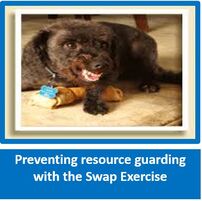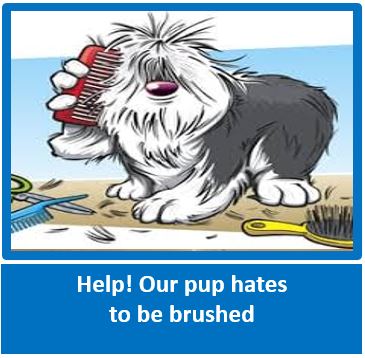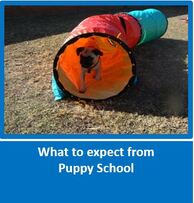
Please visit and LIKE our Facebook Page and share with family, friends and on your own Facebook page, and ask them to share further – it is only by working together and sharing knowledge and education that we can improve the lives of dogs and assist owners. We do not inundate you with posts – an average of 5 per week, and the odd Did You Know. Thank You!
FEEDING YOUR PUPPY FROM WHEN IT COMES HOME
By Scotty Valadao – Friends of the Dog

When you first bring the pup home, initially feed your pup the same food as the breeder or the shelter, either bringing some home with you from the breeder, or stocking up before you collect the pup.
A pup often has a loose tummy due to stress for the first few days at the new home and if you are using the same food as the shelter or breeder, you can eliminate new food as a reason for the loose tummy.
If you do decide to change to a different food, do so only after the pup has settled down. By then you will know your pup’s normal elimination habits and what a normal stool looks like, and this will ensure that there will be no stress related tummy incidents, and if there is a running tummy, it could be illness related - if in doubt always check with your vet, as pups can quickly deteriorate.
When changing food, you do so slowly, especially with a puppy and ensure that you do not supplement the pups diet with table scraps, treats etc during this time, so that is there is no intestinal upset, you will know that it occurred due to the change in the food. When we say slowly, we mean exactly that - add in 1 teaspoon of the new food, and take out 1 teaspoon of the old food. Do this for 2 days, and when you see there is no ill effects, start to increase 1 teaspoon per day, as above, until the pup is on only the new food.
If you do find that your pup has a tummy upset by vomiting, loose stools or constipation after eating, stop adding immediately, and if the tum does not improve, take the pup to the vet. This could well be illness and not the food and the quicker the pup is treated, the better. Your vet will be able to determine if it is food related or illness or if the pup has intolerance to the food.
Diet is extremely important as not only does it affect a dog’s health it has also been proven to have an effect on a dogs behaviour, which many pet owners are not aware of. Many of the cheaper foods contain inferior ingredients, preservatives and colouring. It is now known that preservatives and colourings can have an affect on both human and canine behaviour and of course, if the ingredients are inferior, your pup is not getting the proper nutrition it deserves.
Not all dog foods available are top quality and always buy the very best you can afford, especially for the first year of your pups life (small breed) and 18 months of age in the larger breeds. During this period of time there are major changes taking place in the skeleton and providing a good quality food ensures that your pup will develop at the correct rate, neither too fast or too slowly and cuts down on the possibility of any skeletal abnormalities developing.
Purchasing an economy food can result in your pup receiving poorer grade ingredients with less digestibility which means that a lot of the food passes through there systems without being absorbed – this makes for the dog needing more food and producing larger stools. If feeding a good quality food your pup will not need to eat as much and less stools for you to pick up. I also find on the better quality foods that there is a lot less (often none) flatulence. Think of this from a human point of view – if something that causes gas every time you eat -is this food agreeing with your body?
We personally are in favour of the raw diet for dogs, provided that this is purchased from a manufacturer that is registered with the Department of Agriculture as per their conditions. There is still a lot of controversy over the raw diet for dogs, and this is a topic that each owner needs to decide from themselves. We have supplied a link to the BARF diet at the bottom as a starting point for your research. It can be more expensive than many of the standard kibble foods offered, but does seem to result in improved health, smaller stools etc - just as with humans, the healthier you eat the more likely you are to have good health, which in turn results in less visits to the vet. Speak to the manufacturer of the food as to what they recommend where pups are concerned regarding a feeding schedule.
Our next option would be a kibble such as Acana, Orijen, Earthborn or similar. These products differ in what they contain, but overall contain much more real meat and organs and are free from high-glycaemic grains than a standard kibble. In addition to the better meat products, they normally contain ingredients such as oats, fresh beans, peas, carrots, herbs etc, and contain the necessary vitamins and safe additives. As with raw food, more expensive, but contributes to a healthier pup and if you decide on this option, have a look at each brand to see which you prefer.
If you decide on a Vet recommended kibble, then we suggest chatting to your vet about what will suit your pup the best. There are multiple options available, but we do suggest investigate the brand and ingredients and make yourself informed - your dog can't read or decide for itself!
A pup often has a loose tummy due to stress for the first few days at the new home and if you are using the same food as the shelter or breeder, you can eliminate new food as a reason for the loose tummy.
If you do decide to change to a different food, do so only after the pup has settled down. By then you will know your pup’s normal elimination habits and what a normal stool looks like, and this will ensure that there will be no stress related tummy incidents, and if there is a running tummy, it could be illness related - if in doubt always check with your vet, as pups can quickly deteriorate.
When changing food, you do so slowly, especially with a puppy and ensure that you do not supplement the pups diet with table scraps, treats etc during this time, so that is there is no intestinal upset, you will know that it occurred due to the change in the food. When we say slowly, we mean exactly that - add in 1 teaspoon of the new food, and take out 1 teaspoon of the old food. Do this for 2 days, and when you see there is no ill effects, start to increase 1 teaspoon per day, as above, until the pup is on only the new food.
If you do find that your pup has a tummy upset by vomiting, loose stools or constipation after eating, stop adding immediately, and if the tum does not improve, take the pup to the vet. This could well be illness and not the food and the quicker the pup is treated, the better. Your vet will be able to determine if it is food related or illness or if the pup has intolerance to the food.
Diet is extremely important as not only does it affect a dog’s health it has also been proven to have an effect on a dogs behaviour, which many pet owners are not aware of. Many of the cheaper foods contain inferior ingredients, preservatives and colouring. It is now known that preservatives and colourings can have an affect on both human and canine behaviour and of course, if the ingredients are inferior, your pup is not getting the proper nutrition it deserves.
Not all dog foods available are top quality and always buy the very best you can afford, especially for the first year of your pups life (small breed) and 18 months of age in the larger breeds. During this period of time there are major changes taking place in the skeleton and providing a good quality food ensures that your pup will develop at the correct rate, neither too fast or too slowly and cuts down on the possibility of any skeletal abnormalities developing.
Purchasing an economy food can result in your pup receiving poorer grade ingredients with less digestibility which means that a lot of the food passes through there systems without being absorbed – this makes for the dog needing more food and producing larger stools. If feeding a good quality food your pup will not need to eat as much and less stools for you to pick up. I also find on the better quality foods that there is a lot less (often none) flatulence. Think of this from a human point of view – if something that causes gas every time you eat -is this food agreeing with your body?
We personally are in favour of the raw diet for dogs, provided that this is purchased from a manufacturer that is registered with the Department of Agriculture as per their conditions. There is still a lot of controversy over the raw diet for dogs, and this is a topic that each owner needs to decide from themselves. We have supplied a link to the BARF diet at the bottom as a starting point for your research. It can be more expensive than many of the standard kibble foods offered, but does seem to result in improved health, smaller stools etc - just as with humans, the healthier you eat the more likely you are to have good health, which in turn results in less visits to the vet. Speak to the manufacturer of the food as to what they recommend where pups are concerned regarding a feeding schedule.
Our next option would be a kibble such as Acana, Orijen, Earthborn or similar. These products differ in what they contain, but overall contain much more real meat and organs and are free from high-glycaemic grains than a standard kibble. In addition to the better meat products, they normally contain ingredients such as oats, fresh beans, peas, carrots, herbs etc, and contain the necessary vitamins and safe additives. As with raw food, more expensive, but contributes to a healthier pup and if you decide on this option, have a look at each brand to see which you prefer.
If you decide on a Vet recommended kibble, then we suggest chatting to your vet about what will suit your pup the best. There are multiple options available, but we do suggest investigate the brand and ingredients and make yourself informed - your dog can't read or decide for itself!




